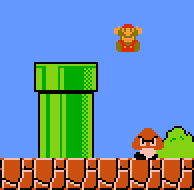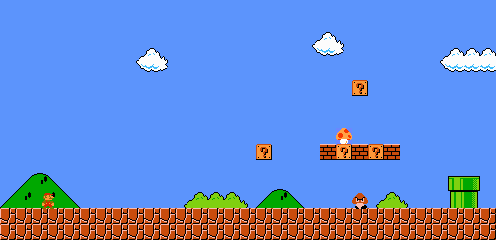So here’s a disheartening sight: Nintendo CEO Satoru Iwata reveal Nintendo’s internal polling about how many gamers can make it through the first level of Super Mario Bros. The results, let us say, are not pretty. To quote the article more extensively, and Iwata specifically:
“It may come as a shock to some of you that most gamers today cannot finish the original Super Mario Brothers game on the Famicom,” he said. “We have conducted this test over the past few years to see how difficult we should make our games and have found that the number of people unable to finish the first level is steadily increasing.”
At this point, a whopping 90% of participants couldn’t finish the level. (We presume that means they used up their few available lives before having to restart the game.)
He also noted that most didn’t understand basic game mechanics such as the run button, or that coins are to be collected and aren’t enemies, or the concept of a bottomless pit. About 70% died at the first enemy, and half of those died at that same spot twice. (Twice! At the hands [or lack thereof] of the first Goomba!)
Participants said that they wanted the game to be easier, and that Mario should perhaps start the game with a sword or a gun. Some didn’t even realize that Super Mario Bros was an actual vintage game…“As a stockholder, you should be relieved to know that our games are easier in order to attract a wider audience,” he told the crowd. “As a gamer, you might feel a little sad, and you should be. It is quite sad.” Indeed.
Wow, just wow. Things have changed, but who could think they would change THIS much so fast? How can Mario NOT be interesting? Am I missing something? I didn’t even play NES that much as a kid, and it’s fabulous. When the game came out, I wasn’t even ALIVE. Think about that for a second, and you’ll know I’m not bluffing. I played a lot of SNES, a lot of Genesis, a lot of Nintendo 64, a lot of Playstation (heck, a TON of Playstation), and onward we go. Each and every game I played, good and bad, fit like a well-worn glove. The developers knew what experience they wanted to craft, and you got it (even if their vision felt a little shoddy at times, or clashed with the marketing).
Of course, the great things about the above is precisely in that it is a parody! Satoru Iwata never said any of the above, yet I believed every word of it until I was told otherwise! Clearly, that means it is an effective parody, which is “a literary or musical work in which the style of an author or work is closely imitated for comic effect or in ridicule.” In effect, by exaggerating the actual state of video gamers, they’ve made it more clear that this mentality (or, at least, the approach of some gamers to gaming in general) is more prevalent than we think. It’s close enough to the real thing, in any event!
The wonderful and great thing about video games (and most games in general): just playing them, and having a designer understand how to introduce new challenges, new tools, and great level design (or randomness, as in roguelikes), is like an art unto itself. No one would sing Super Mario Bros.’ high praises, now or then, if not for its utterly impeccable running and jumping physics, its general intuitiveness, and the progression of its challenges. It set a standard by which all other video games would be judged forever. No wonder it’s in video game exhibits held in museums (not that this lends credibility to my claims at all).
Is it repetitive? Yes! Will I keep playing it? Double yes! Why? Because the game itself has wonderful design that sustains my interest. It just feels good to play! Some call it “game feel” and other “kinesthetics”, but it’s rare to feel that way with any modern game. The more realistic they become, the less they can rely on our suspension of disbelief. Realism has video games in a rut. They can’t rely on their “gameplay”, so they accost us by other means – story, graphics, etc.
I’d say us older gamers had it wonderful because we learned that way. And learning was made FUN. Modern games rarely force us to learn anything, merely shuffling us along for the purpose of telling a self-serious mediocre tale. So many tutorial boxes! So many times where I effortlessly pass through a goal! And so many times when Elizabeth will throw a health pack or useless item at my face – Bioshock Infinite is the zenith of that trend, quite literally. Health packs can work in a game as a form of non-regenerative health (i.e., you must learn where to find health in a stage or die), but it’s just abstract nonsense in that game.

That’s where this article really disturbs me: because it shows that many gamers have an impression of the market they continue to support. The casual gamers, so it goes, have been trained NOT to like a difficult experience from the outset without even TRYING to persevere. The game should hand them the victory! This is my entertainment! But that’s a hollow victory. The key to the article is that the first level of Mario ISN’T difficult. It’s an introductory level, designed to familiarize yourself with the game WITHOUT blasting a tutorial in your face. It doesn’t have to, precisely because it is well-designed. But most gamers, now weaned on a different and degenerative style, can’t even make it without constant handholding. They don’t have the independence or desire to learn, just to make it through the product they paid for. That speaks volumes.
Even if it’s not true, we do see this trend in modern games. What we have now, as far as the AAA market goes (and perhaps into indie games a bit), is interactive cutscenes. You’ll note that the game underneath rarely becomes mechanically interesting or fun in itself. They are the vehicle to get you from cutscene to story sequence B. It is the transition period, not the focus. You can see this from games like Grand Theft Auto IV (and most open world games), where the “world” becomes a glorified mission selection interface – drive through boring town, get cutscene. And people say grinding in RPGs is boring!
Most games do not rely on their mechanics, sorry to say. Many of us have forgotten how games of old provided clear, distinct presentation and razor-sharp control. While some were difficult, not all were, but it didn’t make them less entertaining. I didn’t feel cheated or blasted by external elements like today’s games now must do.
I played Assassin’s Creed III recently, and couldn’t have been more disappointed at the lack of an actual “game” behind all the Revolutionary War hype. And it has an interesting story, granted, that’s supposed to hook you into the experience. Then you do all the stupid busywork in-between, a mess of half-baked ideas and uncooked mechanics and glitches. For a comparison a little closer to my wheelhouse, compare later Marios to early Marios and you can see that difference enough. Super Mario 64’s physics feel entirely different than Super Mario Galaxy, and not necessarily for the better. Yes, the difference makes the game easier, and knocks you over the head with tutorial boxes, but it doesn’t make the game better by any stretch. One lets you learn by nature, the other by forced canned sequence.
I find this a sad state of affairs. Games naturally challenge; those that don’t quickly become uninteresting. When there’s nothing to learn, what meaning can we find in play other than a temporary aesthetic experience? Why change games into film, rather than letting them become their own thing? I can answer this easily: the mass market makes it so. Of course, this will come to a cost and a head in the future, but let it be known that I said it first: games degenerate quickly unless bolstered by something, and that something comes from learning and progressive curves of challenge and difficulty. Without it, you merely spin the wheels and turn the nobs of the game designer’s creation.
I realize this is unpopular to say, and that the majority of gamers will go on with their lives and dismiss me with a wave of their hand. Then again, that doesn’t mean they are not wrong. It’s enough to make a man feel like Jeremiah sometimes:
7 O Lord, You have deceived me and I was deceived;
You have overcome me and prevailed.
I have become a laughingstock all day long;
Everyone mocks me.
8 For each time I speak, I cry aloud;
I proclaim violence and destruction,
Because for me the word of the Lord has resulted
In reproach and derision all day long.
9 But if I say, “I will not remember Him
Or speak anymore in His name,”
Then in my heart it becomes like a burning fire
Shut up in my bones;
And I am weary of holding it in,
And I cannot endure it.
10 For I have heard the whispering of many,
“Terror on every side!
Denounce him; yes, let us denounce him!”
All my trusted friends,
Watching for my fall, say:
“Perhaps he will be deceived, so that we may prevail against him
And take our revenge on him.”
But we can’t just rail against things and feel poorly about it. We need concrete examples; we need to find the root of the degeneration and the problem.

